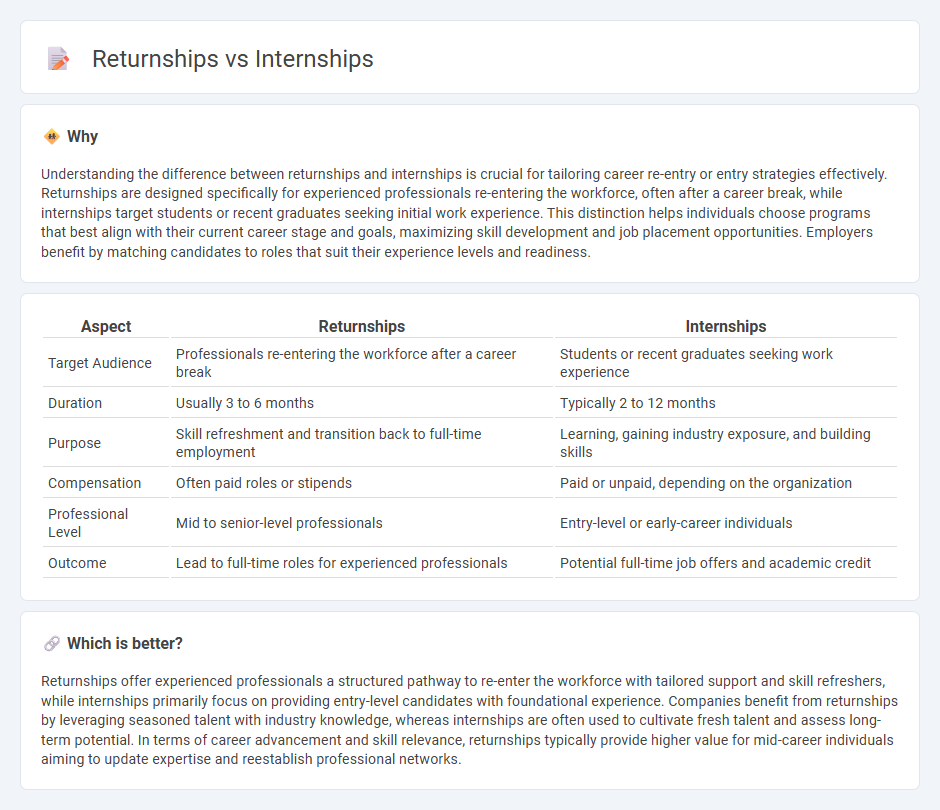
Returnships offer experienced professionals, particularly those reentering the workforce, structured opportunities to regain industry skills and update resumes, contrasting with internships primarily designed for students or recent graduates gaining initial work experience. Unlike internships, which focus on learning basics and exposure, returnships emphasize leveraging prior knowledge while adapting to contemporary workplace demands. Explore how these programs cater to different career stages and help bridge employment gaps.
Why it is important
Understanding the difference between returnships and internships is crucial for tailoring career re-entry or entry strategies effectively. Returnships are designed specifically for experienced professionals re-entering the workforce, often after a career break, while internships target students or recent graduates seeking initial work experience. This distinction helps individuals choose programs that best align with their current career stage and goals, maximizing skill development and job placement opportunities. Employers benefit by matching candidates to roles that suit their experience levels and readiness.
Comparison Table
| Aspect | Returnships | Internships |
|---|---|---|
| Target Audience | Professionals re-entering the workforce after a career break | Students or recent graduates seeking work experience |
| Duration | Usually 3 to 6 months | Typically 2 to 12 months |
| Purpose | Skill refreshment and transition back to full-time employment | Learning, gaining industry exposure, and building skills |
| Compensation | Often paid roles or stipends | Paid or unpaid, depending on the organization |
| Professional Level | Mid to senior-level professionals | Entry-level or early-career individuals |
| Outcome | Lead to full-time roles for experienced professionals | Potential full-time job offers and academic credit |
Which is better?
Returnships offer experienced professionals a structured pathway to re-enter the workforce with tailored support and skill refreshers, while internships primarily focus on providing entry-level candidates with foundational experience. Companies benefit from returnships by leveraging seasoned talent with industry knowledge, whereas internships are often used to cultivate fresh talent and assess long-term potential. In terms of career advancement and skill relevance, returnships typically provide higher value for mid-career individuals aiming to update expertise and reestablish professional networks.
Connection
Returnships and internships both serve as structured programs designed to provide practical work experience, with internships primarily targeting students and recent graduates while returnships focus on professionals re-entering the workforce after a career break. Both opportunities facilitate skill development, networking, and career transitions, enhancing employability in competitive job markets. Organizations leverage these programs to tap into diverse talent pools and foster workforce inclusion.
Key Terms
Entry-level experience
Internships provide entry-level experience by offering students and recent graduates hands-on training in their chosen fields, often lasting several months during academic breaks. Returnships target professionals re-entering the workforce after a career gap, combining skill refreshment with work experience in a short-term, paid program designed to ease the transition back into full-time roles. Explore how these programs differ and which best suits your career path by learning more about their benefits and opportunities.
Career reentry
Internships provide hands-on experience for students and recent graduates entering the workforce, while returnships are tailored programs designed to help mid-career professionals reenter the job market after a hiatus. Both opportunities emphasize skill development and professional networking, but returnships specifically address challenges faced by individuals resuming careers after extended breaks. Explore more to understand how these pathways can strategically support career reentry goals.
Professional development
Internships provide students and early-career professionals with hands-on experience, skill-building opportunities, and industry exposure essential for career growth. Returnships target experienced professionals re-entering the workforce, offering tailored mentorship, updated training, and networking to bridge employment gaps and regain professional momentum. Explore how internships and returnships can uniquely enhance your professional development path.
Source and External Links
What Is an Internship? - UMBC Career Center - An internship is a supervised, structured professional learning experience related to a student's field of study that involves meaningful work, career exploration, skill development, and regular feedback, typically requiring at least 120 hours.
NASA Internship Programs - NASA offers paid internships through programs like Pathways that provide hands-on experience, mentoring, career development, and can lead to full-time employment in STEM fields, plus fellowship opportunities for graduate research aligned with NASA's mission.
Internships for students - Amazon.jobs - Amazon internships offer rising seniors and recent graduates opportunities to own impactful projects, gain skills through training and hands-on work, build global networks, and receive mentorship to support career growth.
 dowidth.com
dowidth.com